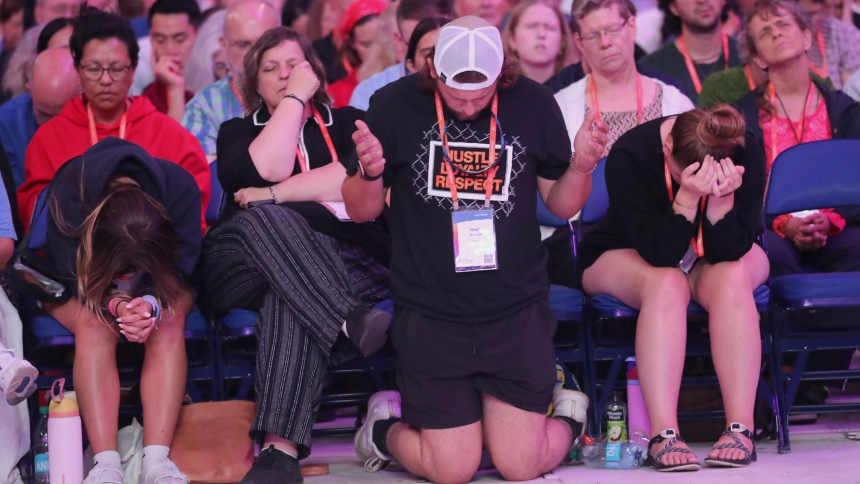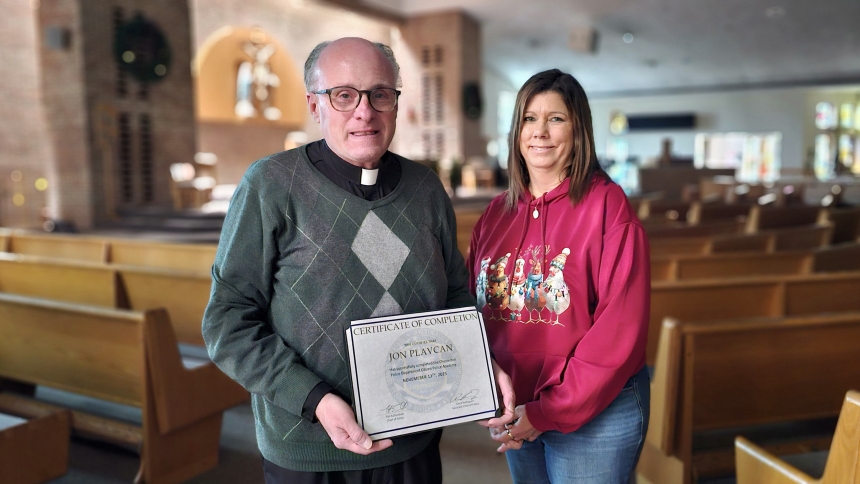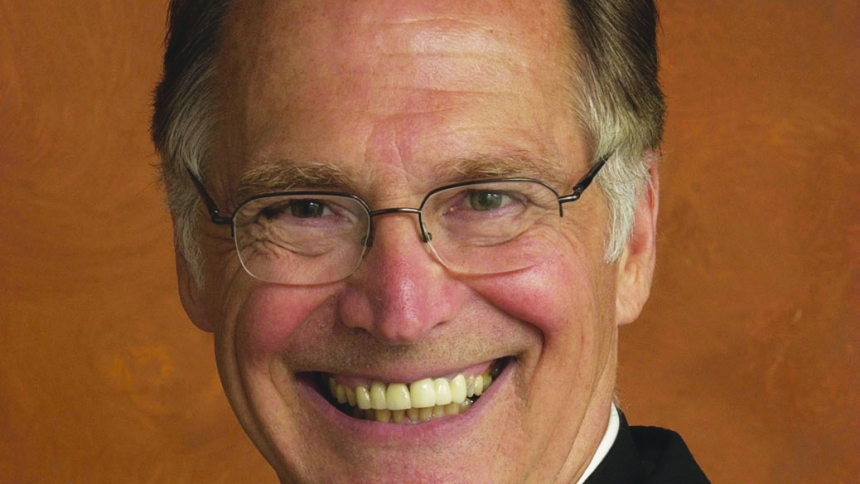
INDIANAPOLIS (OSV News) - At the close of the National Eucharistic Congress' final Mass, Bishop Andrew H. Cozzens of Crookston, Minnesota, asked the crowd of 60,000 gathered in Lucas Oil Stadium July 21 if they would take their love of the Eucharist and the church, strengthened over the five days of the congress, and identify one person in their life to intentionally evangelize.
"Brothers and sisters, we believe that God desires to renew his church, and that this renewal will happen through you. And then, in renewing his church, he will renew the world," said Bishop Cozzens, board chairman of National Eucharistic Congress, Inc.
"What you received as a gift, you must give as a gift," he said. "This year we've invited you to 'walk' with one person. What would happen if each of you thought of one person you know who's currently away from the faith; and you decided to pray for them and befriend them and then invite them to take one step closer to Jesus and his church?
"What would happen if 70 million Catholics did that?" he asked, referring to an estimated number of Catholics in the United States. "And so my question is: Will you do it? Will you do it?"
The crowd cheered. Bishop Cozzens referred them to the U.S. bishops' Walk with One initiative, launched with the congress, that provides resources to help Catholics engage in "spiritual companionship" and effectively evangelize through their existing relationships.
The initiative is a key component of the Year of Mission, the third and final year of the U.S. bishops' National Eucharistic Revival, which began in 2022 and included the July 17-21 congress and its preceding National Eucharistic Pilgrimage.
Standing behind the stage following the congress's final Mass, Bishop Cozzens told OSV News that the congress's final Mass "was the commissioning, and really inviting people to be sent to take up the missionary year of the Eucharistic revival."
Bishop Cozzens said he got the sense that after the congress, attendees were ready to evangelize.
"I asked them if they're willing to 'walk with one,' and they said yes," he said.
That day, after the Mass, Norma Williamson and Pearl Nelson, members of St. Fabian Parish in Hattiesburg, Mississippi, said they talked over lunch with two of their fellow congress-goers about what it would mean for them to "walk with one."
Nelson said she planned to reach out to a family member who is no longer practicing the Catholic faith and share some of what she learned at the congress.
Williamson hoped to garner interest and enthusiasm for the Eucharist and evangelization at her parish by organizing groups to watch the congress's dynamic talks.
Nelson said she took to heart what Sister of Life Bethany Madonna said while speaking in Lucas Oil Stadium on the congress's first night "that you don't just ... jump right in and say, 'I want you to come to church with me' -- that you would maybe just invite them over for lunch or tea or whatever, and have a casual conversation, maybe get to know the person better, get some ideas."
Nelson also wondered whether using praise and worship music at youth-geared parish events would attract their younger members. She and Williamson were amazed when they saw youth and young adults rush to the stage, waving their hands to the music in worship on the congress's Friday and Saturday evenings. They had never seen anything like it in the Catholic Church.
"They were so excited," Nelson said. "That felt really good. ... That they felt comfortable running up to the front of the stage and worshipping; it was an eye-opener. Very refreshing."
Derrek Nguyen, 16, was among the estimated 5,000 congress-goers under age 18. He attended with his youth group from Our Lady of Perpetual Help Parish in Kearns, Utah, which especially ministers to Salt Lake City's Vietnamese Catholics.
The casual conversations about the Eucharist and the Catholic Church he had with other attendees compelled him to take ownership of his own faith, and express his excitement to the younger members of his parish whom he helps catechize. Nguyen said he doesn't want them to think the sacraments or their faith formation "is routine."
"It's more than a class," he said. "This is real. This is where you're from. This is who you are."
For Sean Strasma, a 34-year-old youth minister in Georgia, evangelization was part of his experience working as a graphics operator on the congress's production team.
Congress organizers hired "the best of the best" to do graphics, light and sound throughout the event, he said. But of the 80-plus members of the production team, very few were Catholics, Strasma said. Many were evangelical Protestants and used to working non-denominational events.
"They had tons of questions about the Eucharist and what adoration was, and just liturgical aspects, which was really cool," said Stasma, who came into the Catholic Church from evangelical Pentecostalism as an adult. "Just explaining to them that if you accept the premise that the Eucharist is the body, blood, soul and divinity of our Lord and Savior Jesus Christ, that's where a lot of our theology about the liturgical aspects flows from."
He said one of his takeaways was to reconsider how he approaches the Catholic faith with his Protestant family members.
Stasma also hoped the congress proved to parents the value of youth conferences for their teenagers, because, while many of the youth attendees have likely been to SEEK, NCYC or a Steubenville Conference, "a lot of the adults, they've never had an experience like this, and it was really cool to see them go to a conference like this for the first time."
Caption: Pilgrims pray during a July 19, 2024, Encounter impact session at Lucas Oil Stadium during the National Eucharistic Congress in Indianapolis. (OSV News photo/Bob Roller)


